
What the Insurrection Act is (and why it matters):
The Insurrection Act is a federal law first enacted in 1807, granting the President authority to deploy the U.S. military and federalize the National Guard for domestic law-enforcement purposes in times of insurrection, rebellion, or widespread civil disorder. It stands as a narrow exception to the Posse Comitatus Act of 1878, which generally prohibits the use of federal troops in civilian law enforcement Over its two-century history, this law has been invoked just a few times—by Lincoln during the Civil War, Eisenhower during integration in Little Rock, and George H.W. Bush during the 1992 Los Angeles riots
What Trump has said and done:
Amid escalating protests in Los Angeles over mass ICE raids and deportations, former President Trump has openly signaled he would “certainly” consider invoking the law—an extremely rare and momentous decision. Already over 4,000 National Guard members and 700 active-duty Marines have been stationed in Los Angeles County under Title 10 federal authority, though they currently lack law-enforcement powers such as arrest authority. Trump seems prepared to escalate this deployment by officially invoking the Insurrection Act, which would allow these forces legal authority to quell civil unrest—bypassing the authority of California Governor Gavin Newsom .
What’s at stake and why it’s controversial:
-
Scope of presidential power: The Act grants sweeping discretion, allowing the president to determine unilaterally whether an incident qualifies as insurrection or rising violence justifying military deployment. There is no requirement for judicial or congressional approval, raising constitutional concerns around unchecked executive force .
-
Civil liberties alarm: Legal scholars argue that using untrained military personnel for crowd control could pose serious civil rights risks—threatening freedoms of speech, assembly, and due process
-
Federal vs. state authority: California officials, including Gov. Newsom and LA Mayor Karen Bass, argue the deployment is unconstitutional and have initiated legal challenges They contend managing protests is a state duty, and federal military involvement without request violates federalism.
-
Precedent and democratic erosion: The Act has seen only sporadic past use, reserved for grave national emergencies. Critics fear invoking it in LA protests—centered on immigration and civil-demonstration—risks normalizing military intervention in peaceful dissent, undermining democratic norms .
Where things stand now:
Trump has not yet issued a presidential proclamation formally invoking the Act—an essential legal step that would include ordering protesters to disperse or face military action . Meanwhile, legal proceedings continue, with Governor Newsom and local leaders seeking injunctions. Federal officials emphasize that even military forces deployed under the Act remain bound by constitutional limitations like the First and Fourth Amendments
Why this matters:
This potential invocation marks a watershed moment in the balance of federal authority and civil liberties. Employing active-duty troops to enforce domestic law without state consent challenges historical checks and raises urgent questions: Does the severity of immigration-related protests meet the legal threshold for insurrection? Or does this step constitute an overreach—a move toward authoritarian governance?
Even if the proclamation never materializes, Trump’s threat alone has set off profound constitutional debates, prompting lawsuits, political backlash, and a national reckoning over the boundaries of executive power.

